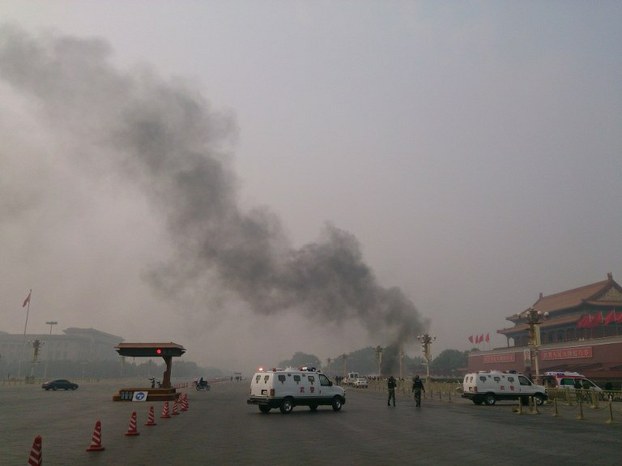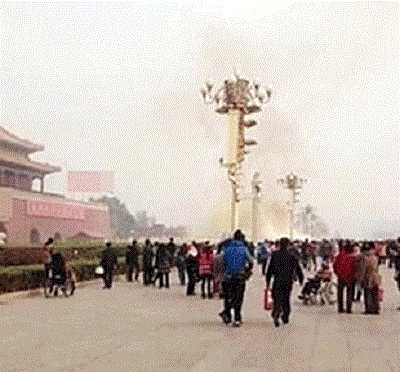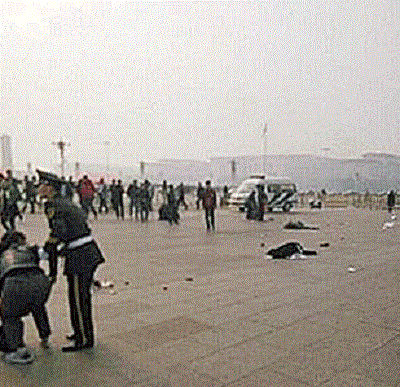




Updated at 6:30 p.m. ET on 2013-10-29
Authorities in the Chinese capital on Tuesday threw a tight security cordon around Tiananmen Square following a fatal jeep crash, patrolling Beijing's streets as reports emerged of a possible connection to the restive western region of Xinjiang.
Three people believed to be ethnic minority Uyghurs drove an SUV into a crowd thronging near Tiananmen Gate—a symbol of the ruling Chinese Communist Party—on Monday, before setting it on fire, killing themselves and two tourists and injuring 38 others.
Police are now hunting for two men from Xinjiang with Uyghur names, according to security bulletins issued to hotels in the capital and circulating widely online.
The bulletins identified potential suspects linked to the incident as Yusup Ahmat from Guma (in Chinese, Pishan) county and Yusup Omarniyaz of Pichan (in Chinese, Shanshan) county.
Locals in Beijing told RFA they had seen police checking ID cards of Uyghurs in the city streets and that hotels had been instructed not to accept patrons from Xinjiang.
But police have not publicly confirmed the ethnicity or identity of suspects, prompting overseas Uyghur rights groups to urge caution and calm in investigations surrounding the crash.
The Germany-based exile World Uyghur Congress issued a statement saying it was concerned about the lack of official information about the crash, saying it feared the incident could "incite a fierce crackdown" on the Uyghur people.
“The Chinese government will not hesitate to concoct a version of the incident in Beijing, so as to further impose repressive measures on the Uyghur people," the group's president Rebiya Kadeer said in a statement.
Police bulletins
An employee who answered the phone at a hotel in the Panjiayuan antiques market district of Beijing on Tuesday confirmed it had received a police bulletin about a search for people from Xinjiang.
"We can't accept [guests from Xinjiang]," she said. "We got a directive from the police department."

According to the police notices, the men were likely driving a beige SUV with Xinjiang license plates.
"To prevent the suspected persons and vehicles from committing further crimes ... please notify law enforcement of any discovery of clues regarding these suspects and the vehicles," one notice, which was widely circulated on Chinese microblogs, said.
The notice listed Yusup Omarniyaz as hailing from Pichan's Lukchun township, where deadly clashes on June 26 left dozens of police and civilians dead.
RFA could not confirm the reports of his hometown, however, and an official who answered the phone at the Lukchun township police station declined to comment.
"You can't call the local police station for information; you have to get in touch with the police department," he said.
Patrols stepped up
Meanwhile, police have stepped up patrols near Tiananmen Square, which neighbors government headquarters in Zhongnanhai, residents said.

Xinjiang-based rights activist Hu Jun said China is no stranger to suicide attacks, which are increasingly used as a last resort to protest against alleged government wrongdoing.
"The Chinese Communist Party has left ordinary people in a completely dead end," Hu said. "This isn't just an ethnic minority issue; Han Chinese have been forced into similarly impossible positions by the government."
However, he said that ethnic tensions had increased greatly in Xinjiang since the government began knocking on the doors of family homes to carry out security checks, night-time raids, and patriotic education campaigns.
"This is a horrible method to use," he said. "Officials from cities and townships are going down to the countryside and carrying out interviews and searches in individual homes."
"This means they are searching and watching their homes, and this has caused tensions to get more and more acute," Hu said.
'Terrorism'
Chinese authorities usually blame outbreaks of violence in Xinjiang on "terrorists" among the region's mostly Muslim Uyghurs.
But rights groups and experts say Beijing exaggerates the terrorism threat to take the heat off domestic policies that cause unrest or to justify the authorities' use of force against Uyghurs.
However, unrest in the troubled region has never before resulted in attacks in Beijing itself, although self-immolation attempts by Han Chinese with grievances have been reported.
In July, Han Chinese disabled petitioner Ji Zhongxing, who was handed a six-year jail term last week, set off an explosion at the city's international airport amid a protest over a police beating that he said had confined him to a wheelchair.
Police search
Beijing police said late on Monday they were looking for two suspects from Xinjiang in connection with a "major incident," though it was unclear if these were the people who were in the vehicle or accomplices still at large, Reuters reported.
It quoted the two sources as saying that the jeep's occupants were suspected of lighting a flammable substance in the vehicle.
"It was no accident. The jeep knocked down barricades and rammed into pedestrians. The three men had no plans to flee from the scene," said one source with "ties to the leadership."
Police said on Monday the sport utility vehicle veered off the road at the north of the square, crossed the barriers and caught fire almost directly in front of the main entrance of the Forbidden City, in front of the portrait of late supreme leader Mao Zedong, the symbol of Communist China.
Photos of the aftermath showed the vehicle after it had traveled several hundred meters along the pavement in front of the portrait before bursting into flames, knocking down people as it went.
However, the photos were rapidly removed from the tightly controlled Twitter-like service Sina Weibo.
Reported by Hai Nan for RFA's Cantonese Service and by Qiao Long for the Mandarin Service. Translated and written in English by Luisetta Mudie.